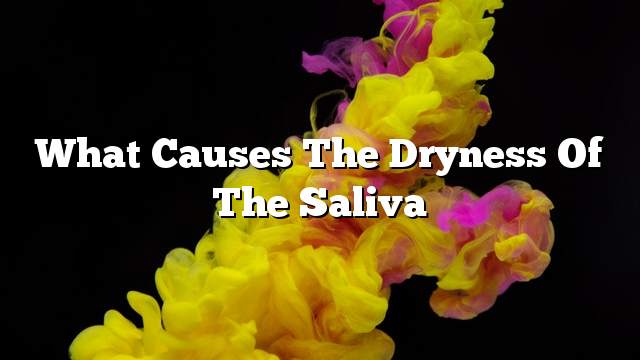Dry mouth
Some sometimes complain of waking up at night to drink a glass of water because of their dry mouth, or so-called colloidal tongue. Some may wonder why the mouth is dry, which is often caused by insufficient oral intake of saliva. Saliva is released through the salivary glands in the mouth, allowing moisturizing of the mouth and facilitating digestion of food; that is, it moisturizes the food when chewed. Therefore, the cause of dry mouth is a malfunction of the salivary glands, and may be caused by side effects of some drugs, especially in patients with diabetes. In natural humans, the cause of dryness of the saliva is due to the lack of drinking sufficient amounts of water during the day; the body needs water, especially the salivary glands that need water to turn it into a transparent fluid (ie saliva) to keep the mouth moisturized, so be careful to drink water to maintain the correct pulse from Saliva in the mouth.
Benefits of saliva
Saliva is an important part of physical health as a whole; it contains, in addition to water, important substances needed to digest food, and it keeps the teeth strong. The importance of saliva is as follows:
- Maintains the moisture and comfort of the mouth.
- Helps in chewing, taste and swallowing.
- Fighting germs in the mouth.
- It has proteins and minerals that protect tooth enamel, prevent decay and gum disease.
- Keeps the false teeth in place.
Causes of dry mouth
Oral dryness may be symptomatic of a disease or condition, such as uncontrolled diabetes, and may result from the following:
- pharmaceutical : There are many medicines (whether or not they need a prescription) cause dry mouth, including:
- Antihistamines.
- Drugs for high blood pressure.
- Antidiarrheals.
- Medications for urinary incontinence
- Muscle relaxants.
- Some paralysis drugs (Parkinson).
- Some antidepressants.
- Cancer treatments : Radiation therapy for cancer of the head and neck may destroy some salivary glands, leading to the production of saliva less. Chemotherapy also changes the nature of saliva and the amount of saliva it produces.
- Some pathological conditions Including the following:
- Anxiety disorders and depression.
- Acquired immunodeficiency syndrome (AIDS).
- Parkinson’s disease.
- Uncontrolled diabetes.
- Snoring.
- Alzheimer’s disease.
- Age : Although age is not a factor that increases the likelihood of dry mouth, but the elderly are taking drugs more than others, which makes them more likely to dry mouth. Most of the medicines they use dry the mouth.
- Exposure to surgery or injury : Damage to the head and neck area may lead to dry mouth.
- Go out or play in high heat : Salivary glands may dry up when physical fluids are concentrated elsewhere in the body. The person is more likely to dry his mouth if he continues to play in the hot weather for a long time.
- Tobacco : The bad habits that cause dry mouth are smoking, and chewing tobacco and using argyle also causes it.
Symptoms and signs of dry mouth
Symptoms and signs of dry mouth include:
- Bad breath.
- Difficult to speak.
- Inflammation and cracking lips.
- Taste disorders.
- Fungal infections in the mouth.
- The pain of the tongue.
- Ulcers and inflammatory symptoms in the tongue.
- Increased need to drink water especially at night.
- Increase the frequency of gum infections.
- Increase plaque and tooth decay.
- Difficulty swallowing, chewing and especially dry foods.
* Salivary gland infections.
- Inflammation of the throat.
Complications of dry mouth
Dry mouth can lead to speech and eating difficulties, lead to foul smelling of the mouth, increase tooth decay, and oral infections, including castration.
It should be noted that the victims of dry mouth pay attention to the health and cleanliness of their mouths and teeth in particular; they should be careful to get rid of the layer of plaque, and treatment of inflammation of the gums and decay. Regular brushing, paste and medical thread are necessary.
Treatment of dry mouth
The treatment of dry mouth depends on several factors, the most important of which is to know the underlying cause of dry mouth, and therefore, it is treated with the treatment of the disease or the replacement of the drug, if there are reasons to help to reduce the impact if not treated, including the following:
- pharmaceutical If the dry mouth is thought to be caused by a drug, the doctor will either change it or adjust its dosage.
- The doctor’s description of the drug increases the stimulation of saliva production , Of that pylocarpine.
Tips for dry mouth patients
Dry mouth patients are advised to follow the following tips:
- Avoid drinking alcohol.
- Avoid sweetened foods and beverages.
- Avoid acidic foods and drinks.
- Avoid too cold or hot drinks.
- Reduce caffeine consumption.
- Take care to eat foods, such as carrots because it helps to work salivary glands.
- Breathe through the nose and not the mouth.
Latest research
New research has suggested that pelvic glands can be engineered through stem cells using silk fibers.
